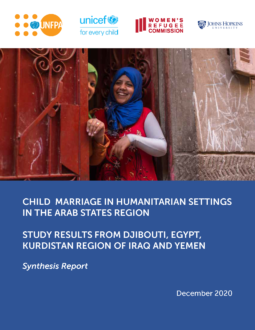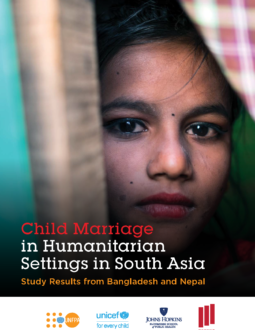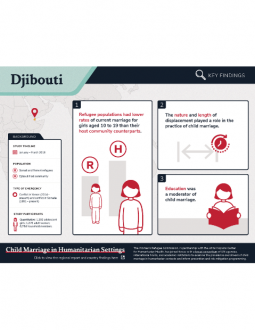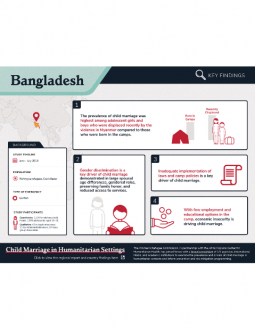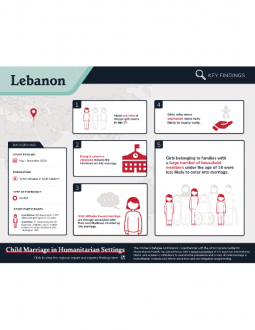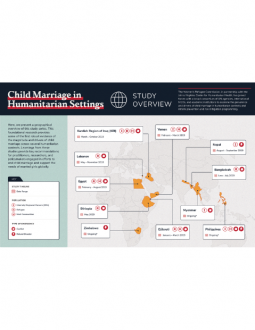
Child Marriage in Humanitarian Settings Study Overview Infographic
PublishedThe Women’s Refugee Commission conducted foundational research, providing some of the first robust evidence of the magnitude and drivers of child marriage across several humanitarian contexts.
This infographic features links to study results from Djibouti, Egypt, the Kurdistan Region of Iraq, Yemen, Bangladesh, Nepal, Ethiopia, and Lebanon.
Learnings from these studies provide key recommendations for practitioners, researchers, and policymakers engaged in efforts to end child marriage and support the needs of married girls globally.
WRC, in partnership with the Johns Hopkins Center for Humanitarian Health, joined forces with a broad consortium of UN agencies, international NGOs, and academic institutions to examine the prevalence and drivers of child marriage in humanitarian contexts and inform prevention and risk mitigation programming.
Study Overview Infographic
Key Implications for Practice Infographic
Based on WRC’s research providing some of the first robust evidence of the magnitude and drivers of child marriage across several humanitarian contexts, this infographic features five implications for practice.
Individual Country Infographics
Study Results
Study Partners
This study on child marriage was made possible thanks to our partners and donors.
- Johns Hopkins University, Center for Humanitarian Health, Bloomberg School of Public Health (JHSPH)
- United Nations Population Fund (UNFPA), including UNFPA Arab States Regional Office (ASRO) and UNFPA Asia and the Pacific Regional Office (APRO)
- United Nations Children’s Fund (UNICEF), including UNICEF Regional Office for South Asia (ROSA) and UNICEF Middle East and North Africa (MENA) Regional Office
- Plan International
- Bangladesh: BRAC University, J.P. Grant School of Public Health; Community Partners International
- Djibouti: Ministry of Women; UNFPA Djibouti; Direction de la Statistique et des Etudes Démographiques [Directorate of Statistics and Demographic Studies] – DISED
- Egypt: Egyptian Society for Healthcare Development (ESHD); UNFPA Egypt; Ministry of Youth and Sports; Etijah; UNICEF Egypt
- Ethiopia: Agency for Refugee & Returnee Affairs; International Medical Corps.
- Iraq: University of Sulaimani; UNFPA Iraq
- Lebanon: The Arab Institute for Women – Lebanese American University; International Rescue Committee (IRC)
- Myanmar: Community Consultation Committee in Kachin State; Kachin Development Group
- Nepal: Nepal Health Research Council; Center for Research on Environment, Health and Population Activities – CREHPA
- Philippines: Transforming Fragilities, Plan International Philippines
- Yemen: Ministry of Health; UNFPA Yemen; Central Statistical Office; the Yemeni Women’s Union.
- Zimbabwe: Plan International Zimbabwe
Donors
- Global Programme to End Child Marriage donors: Governments of Belgium, Canada, the Netherlands, Norway, the United Kingdom and the European Union and Zonta International
- Swiss Agency for Development and Cooperation (SDC)
- Swedish International Development Cooperation Agency (SIDA)
- European Regional Development and Protection Programme (RDPP)
- Global Affairs Canada (GAC)
- Enhancing Learning & Research for Humanitarian Assistance (ELRHA) Research for Health in Humanitarian Crises (R2HC)


